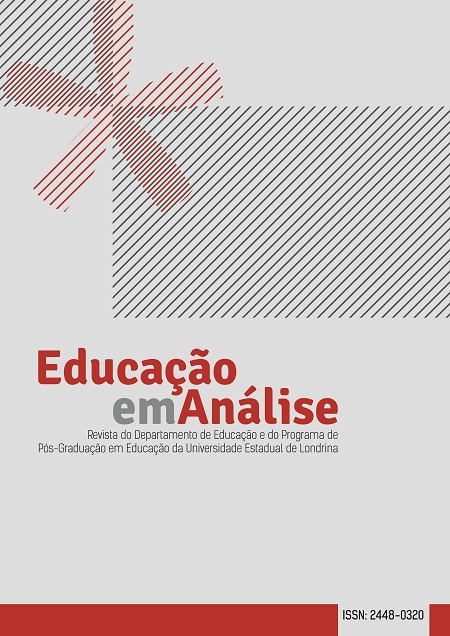Children's literature and training of childhood teachers
DOI:
https://doi.org/10.5433/1984-7939.2016v1n2p195Keywords:
Education, Children's literature, Teacher training and performance, Didactic competence.Abstract
This text aims to reflect on theoretical and methodological elements directed to thinking about the necessary awareness of the professional working in classes of Early Childhood Education, especially regarding the choices of literary books and reading attitudes. This intentionally organized process involves actions prior to reading for children and has a key value in the success of potentially humanizing pedagogical work, that can forgethe birth of effective aspects of reader modes from an early age without addressing early literacy, but focusing on access to material assets of historically accumulated human culture and on the child's active relationship with children's literature. Our theoretical-methodological reflections are based on the principles of Historical-Cultural Theory to support the development of higher psychic functions and specifically human qualities in children; we also use Bakhtin's ideas regarding the appropriation oflanguage. We hope that this text will contribute to the practice of teachers in relation to reading, because, although there is much research in this area, when we see the national indexes on the formation of readers and writers, we have overwhelming results, because children are in school, but the school has not yet figured out how to create subsidies for creating people involved in reading and writing outside the surrounding walls.Downloads
References
BRASIL. Ministério da Educação. Conselho Nacional de Educação.Câmara de Educação Básica. Resolução nº05, 17 de dezembro de 2009. Fixa as Diretrizes Curriculares Nacionais para a Educação Infantil. Brasília, 2009. Disponível em: http://portal.mec.gov.br/dmdocuments/rceb005_09.pdf. Acesso em: 12 abr. 2015.
CAMPOS, K. C. Literatura infantil e a narração de histórias: a Constituição da criança como narradora. In: COLE ‐ CONGRESSO DE LEITURA DO BRASIL:“É preciso transver o mundo”, 17., 2009, Campinas. 2009. Anais.... São Paulo, 2009.
COSTA, Yngrid Karolline Mendonça . Estratégias de Leitura e Literatura Infantil: contribuições para a formação da compreensão leitora em crianças de idade pré‐escolar. Trabalho de Conclusão de Curso (Graduação em Educação) ‐ Universidade Estadual Paulista Júlio Mesquita Filho, UNESP, Marília, 2015.
FARIA, M.A. Como usar a literatura infantil na sala de aula. 3. ed. São Paulo: Contexto, 2006, 156 p. (Coleção Como usar na sala de aula).
FACCI, M.G.D. Valorização ou esvaziamento do trabalho do professor? um estudo crítico‐ comparativo da teoria do professor reflexivo, do construtivismo e da psicologia vigotskiana. Campinas, SP: Autores Associados, 2004.
FOUCAMBERT, J. Modos de ser leitor: Aprendizagem e ensino da leitura no ensino fundamental. Tradução de Lucia P. Cherem e Suzete P.Bornatto. Curitiba: Editora UFPR, 2008.
GENTILI, P. Do ponto de vista neoliberal, os sistemas educativos enfrentam hoje uma profunda crise de eficiência, eficácia e produtividade. 2002. Disponível em: http://www.projetoadia.com.br/not/128‐pablogentili.htm. Acesso em: 4 fev. 2015.
GIROTTO, C.G.G.S.; SOUZA, R.J. Estratégias de leitura: para ensinar alunos a compreender o que leem. In: SOUZA, R.J. (Org.). Ler e compreender: estratégias de leitura. Campinas: Mercado de Letras, 2010.
HARVEY, S.; GOUDVIS, A. Strategies that work: teaching comprehension for understanding and engagement. 2. ed. Portland, Maine: Stenhouse Publisher, 2008.
MELLO, R. De feituras: escrita e ilustração. In: SEMINÁRIO DE LITERATURA INFANTIL E JUVENIL, 7., 2016, Passo Fundo. Palestra.
SOUZA, R. J.; BORTOLANZA, A. M. E. Leitura e literatura para crianças de 6 meses a 5 anos: livros, poesias e outras idéias. In: SOUZA, R.J.; LIMA, E.A. (Org.). Leitura e cidadania: ações colaborativas e processos formativos. Campinas: Mercado de Letras, 2012. p. 1‐15.
Downloads
Published
How to Cite
Issue
Section
License
The journal reserves the right to make normative, orthographic and grammatical changes in the originals, with the aim of maintaining the cultured standard of the language and the credibility of the vehicle. It will, however, respect the authors' writing style. Alterations, corrections, or suggestions of a conceptual nature will be sent to the authors when necessary. In these cases, the articles, after being adequate, should be submitted to a new appreciation.









